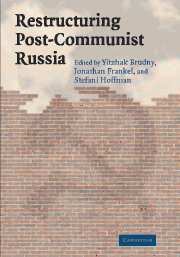Book contents
- Frontmatter
- Contents
- Contributors
- Preface
- Restructuring Post-Communist Russia
- INTRODUCTION
- THE COMPARATIVE DIMENSION
- RUSSIA IN FREE FALL? KEY CHALLENGES
- THE RUSSIAN POLITICAL SYSTEM: TOWARD STABILIZATION?
- The dilemmas of federalism: Moscow and the regions in the Russian Federation
- The evolution of the multiparty system
- The elections since 1989: The end of the chapter?
- Leaders, structural conditions, and Russia's foreign policy
- Index
Leaders, structural conditions, and Russia's foreign policy
Published online by Cambridge University Press: 25 July 2009
- Frontmatter
- Contents
- Contributors
- Preface
- Restructuring Post-Communist Russia
- INTRODUCTION
- THE COMPARATIVE DIMENSION
- RUSSIA IN FREE FALL? KEY CHALLENGES
- THE RUSSIAN POLITICAL SYSTEM: TOWARD STABILIZATION?
- The dilemmas of federalism: Moscow and the regions in the Russian Federation
- The evolution of the multiparty system
- The elections since 1989: The end of the chapter?
- Leaders, structural conditions, and Russia's foreign policy
- Index
Summary
Americans' propensity to see politics as an extension of personality is evident in our thinking on Russia, which exalts the importance of leaders, one-to-one relationships, trust, and communication. The erosion of Soviet institutions under Mikhail Gorbachev and the failure of effective governing structures to take root in Russia under Boris Yeltsin reinforced this perspective by making leaders loom large. Yet the wiser course is to understand and anticipate the foreign policy of a state by focusing on “structural conditions,” the strategic, economic, and demographic forces that are visible now and can, with reasonable confidence, be expected to frame the context of leaders' decisions in the future.
PUTIN AND THE PAUCITY OF POWER
Unfortunately Vladimir Putin, young, energetic, and sober, and in these respects a stark contrast to his predecessor, feeds the national habit of personalizing politics. Putin is expected to produce big results, although there is disagreement about what precisely they will be. Some fear that he will throttle Russia's fledgling democracy, stoke nationalism, and launch an anti-Western, even neo-imperial foreign policy. Others hope that his youth and forcefulness will energize slothful, sclerotic Russia so that order is created, taxes collected, and corruption curbed.
Whatever Putin's designs, they cannot be separated from the structural conditions created by the legacies of the past and the context of the present. Consider, to begin with, his economic constraints.
- Type
- Chapter
- Information
- Restructuring Post-Communist Russia , pp. 250 - 270Publisher: Cambridge University PressPrint publication year: 2004



